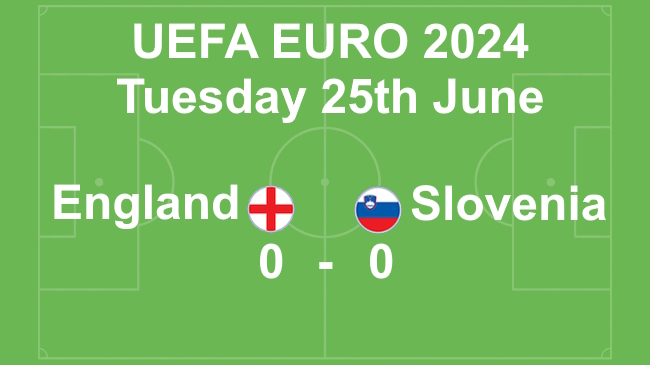Post-Match facts (credit – full match page at www.uefa.com, link opens in a new tab)
A nil-all draw at the Cologne Stadium means England keep their unbeaten record against Slovenia and take top spot in Group C. An emphatic win would have been a crowd-pleaser but it wasn’t necessary given that England knew they’d be in the last 16 whatever happened in this match, win, lose or draw.
The benefit of a win or a draw was the Group C top spot which comes with a draw in the first knock-out match against the 3rd placed team in the sub-league made from 3rd place in the Groups.
That sub-league is down to the competition starting out with 24 not 32 teams. A Winner and Runner-up of 6 groups of 4 gives you 12 of the 16 teams for the first knock-out round and a dark-arts formula using 3rd-place teams spits out the other 4.
England marches on and next play on Sunday 30th June at 5pm.
Previous meetings
Matches 6
England wins 5
Slovenia wins 0
Draws 1
England goals 10
Slovenia goals 4
England have won five of the six meetings between the sides, although only one by a margin of more than one goal.
Slovenia held out for a 0-0 draw at Ljubljana’s Stožice Stadium on 11 October 2016 in what was current England head coach Gareth Southgate’s second match in interim charge.
Southgate’s side were victorious in the home fixture in that 2018 FIFA World Cup qualifying campaign, Harry Kane scoring the only goal four minutes into added time against a Slovenia side coached by Srečko Katanec.
England had won 3-1 at home and 3-2 away against Slovenia in EURO 2016 qualifying, Wayne Rooney scoring in both matches for Roy Hodgson’s side.
Fabio Capello was the England coach as they took on Matjaž Kek’s Slovenia on Matchday 3 of the 2010 World Cup, Jermain Defoe’s first-half goal in Port Elizabeth taking the Three Lions into the round of 16.
Defoe had also got the decisive goal in the first fixture between the sides, a friendly at Wembley on 5 September 2009, after Frank Lampard’s penalty opener; Zlatan Ljubijankič scored a late consolation for Slovenia.
EURO facts
England
The Three Lions are making their 11th appearance at the final tournament and a ninth in the last ten editions of the competition, missing out only in 2008.
EURO 2020 proved to be England’s most successful EURO campaign as they finished first in Group D ahead of Croatia, Czechia and Scotland before knockout wins against Germany (2-0), Ukraine (4-0) and Denmark (2-1 aet) took them into the final for the first time.
Luke Shaw’s second-minute goal gave them the lead against Italy at Wembley, but after the Azzurri levelled Southgate’s side ultimately lost 3-2 on penalties.
In charge since 2016, Southgate oversaw an unbeaten qualifying campaign for EURO 2024, his side winning six of their eight games, scoring 22 goals and conceding only four, to finish six points clear at the top of Group C. England reached a fourth successive EURO with two matches to spare thanks to a 3-1 home win against Italy on 17 October.
England drew 2-2 against Sweden in the group stage of the 2006 World Cup at the Cologne Stadium, their only previous game at the ground, with goals from Joe Cole and Steven Gerrard.
Slovenia
Slovenia’s sole finals appearance came at EURO 2000, when they finished bottom of Group C behind Spain, Yugoslavia and Norway. A side coached by Srečko Katanec opened with a 3-3 draw against Yugoslavia – a game in which they had led 3-0 against ten men with 23 minutes remaining – and bowed out after a goalless draw against Norway having lost 2-1 to Spain on Matchday 2.
Zlatko Zahovič scored three of Slovenia’s four goals at the tournament.
Slovenia were fourth in their EURO 2020 qualifying section, picking up 14 points from their ten games to finish behind Poland, Austria and North Macedonia in Group G.
This time round, Kek’s team were beaten only twice across their ten fixtures as they claimed second place in Group H, level with Denmark on 22 points but behind on head-to-head record.
A 2-1 home win against Kazakhstan in their final fixture ensured Slovenia reached a major international tournament for only the fourth time and a first since the 2010 World Cup. They are yet to go beyond the group stage.
This is Slovenia’s first game at the Cologne Stadium.


